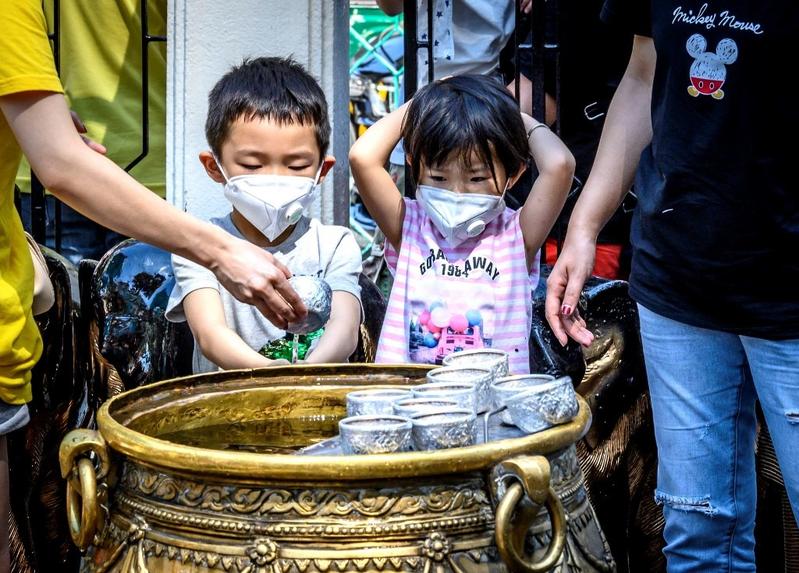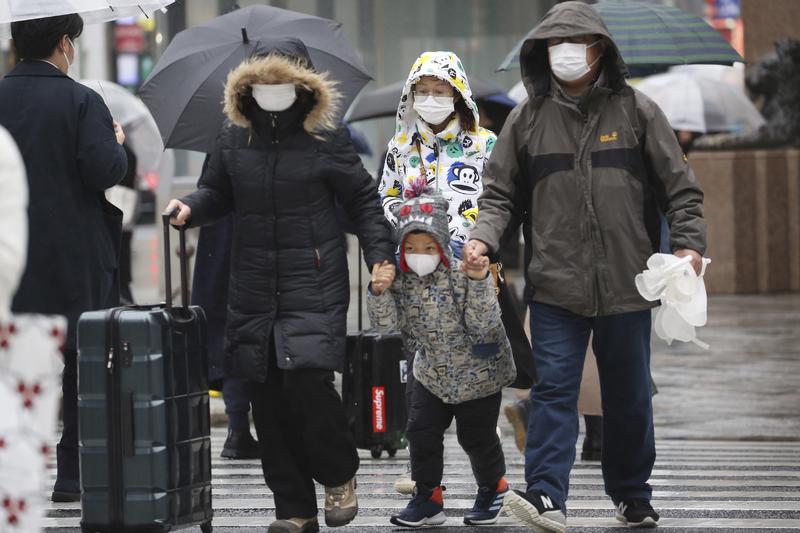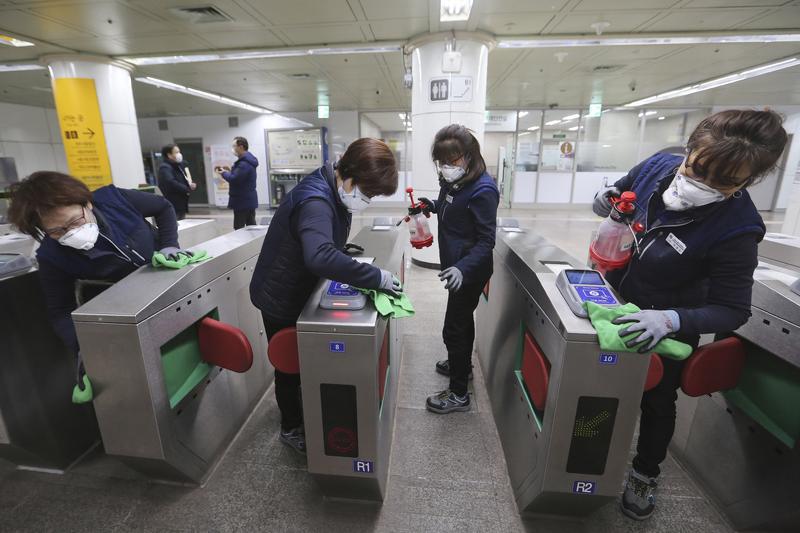 Children with face masks wash their hands before prayer at Erawan shrine, a popular spritual landmark in Bangkok on Jan 27, 2020. (MLADEN ANTONOV / AFP)
Children with face masks wash their hands before prayer at Erawan shrine, a popular spritual landmark in Bangkok on Jan 27, 2020. (MLADEN ANTONOV / AFP)
BANGKOK/TOKYO/SEOUL/NUR-SULTAN/NEW DELHI - Thailand announced plans on Tuesday to screen all arrivals from China for symptoms of a novel coronavirus and confirmed six more infections among such visitors, taking the southeast Asian nation's tally to 14, health officials said.
Japan's govt will send a chartered flight to Wuhan, the epicentre of a virus outbreak in China, to evacuate its nationals wishing to return home
The new strain of coronavirus claimed its first victim in Beijing, the Chinese capital, taking the death toll to 106 as infections reached 4,515, although there have been no deaths outside China.
Five victims among Thailand's new cases, aged between 6 and 70, came from China's central province of Hubei, and belonged to the same family, health official Tanarak Plipat, told reporters, and the sixth from southwestern Chongqing province.
One passenger from among the family of seven travelling together was taken to hospital after showing symptoms on arrival, added Tanarak, the deputy director-general of the department of disease control.
The other four of the family were quarantined after showing symptoms following monitoring, he added.
ALSO READ: Virus spreads with Malaysia, Australia reporting cases
"Now we will expand screening to all Chinese from China and prepare equipment to screen 100%," said Sukhum Kanchanapimai, the permanent secretary of the public health ministry.
Thailand had earlier screened passengers only from China's central city of Wuhan, the epicentre of the outbreak, its southern city of Guangzhou and northeastern Changchun across five airports, from Suvarnabhumi in Bangkok to those at Chiang Mai, Don Mueng, Phuket and Krabi.
In Japan, officials said a Japanese coach driver has been infected with the new coronavirus after coming into contact with Chinese visitors, the first reported case of a possible transmission inside Japan.
The man in his 60s from Nara prefecture had contact with people from Wuhan between Jan 8-16, Japan's health ministry said.
The Japanese driver began showing symptoms on Jan 14 and was hospitalized 11 days later, according to a health ministry statement.
A ministry official, briefing reporters, said the driver had been in close contact with 18 people.
Air evacuations
South Korea plans to send charter flights this week to evacuate its citizens from Wuhan, the epicentre of a virus outbreak in China, Prime Minister Chung Sye-kyun said on Tuesday.
 Chinese tourists wear masks at Ginza shopping district in Tokyo, Jan 28, 2020. (KOJI SASAHARA/ AP)
Chinese tourists wear masks at Ginza shopping district in Tokyo, Jan 28, 2020. (KOJI SASAHARA/ AP)
The planes will arrive in the city as early as Thursday, he said at a ministerial meeting aimed at discussing efforts to prevent the spread of the new coronavirus.
Japan's government will send a chartered flight to Wuhan, the epicentre of a virus outbreak in China, on Tuesday night to evacuate its nationals wishing to return home.
There have been no confirmed cases in the Philippines, but infections have been confirmed in Japan, Nepal, Singapore, S. Korea, Taiwan, Thailand, the US and Vietnam
Foreign Minister Toshimitsu Motegi told reporters the flight can carry around 200 passengers, but added about 650 Japanese citizens are hoping to come back to Japan.
Motegi said the government is making arrangements for additional flights that will leave for Wuhan as early as Wednesday.
In New Delhi, a spokesman for India's Foreign Ministry said authorities were working out the logistics of moving people out of Wuhan.
Indian state airline Air India was on standby to evacuate an estimated 250 Indians from Wuhan in Hubei province, local media reported earlier.
In Bangladesh, Foreign Minister Abdul Momen said talks were underway to bring back Bangladeshi citizens from China.
Visa restrictions
The Philippines stopped issuing visas on arrival to Chinese nationals on Tuesday.
There have been no confirmed cases in the Philippines since the coronavirus outbreak began in China's central city of Wuhan, but infections have been confirmed in Japan, Nepal, Singapore, South Korea, Taiwan, Thailand, the United States and Vietnam.
"We are taking this proactive measure to slow down travel, and possibly help prevent the entry of the 2019-nCov," Jaime Morente, the commissioner of the Philippines' Bureau of Immigration, said in a statement, referring to the virus.
 Employees disinfect ticket gates in hopes to prevent the contraction of the coronavirus at a subway station in Seoul, South Korea, Jan 28, 2020. (AHN YOUNG-JOON / AP)
Employees disinfect ticket gates in hopes to prevent the contraction of the coronavirus at a subway station in Seoul, South Korea, Jan 28, 2020. (AHN YOUNG-JOON / AP)
There is no order barring Chinese nationals from entering the Philippines, however, Morente added. He did not say when the facility would be resumed.
Chinese nationals can still apply for visas at any Philippine embassy or consulate at their places of residence.
Kazakhstan will require medical certificates from Chinese citizens seeking visas and has stopped issuing electronic visas to them on arrival as a protective measure, deputy foreign minister Shukhrat Nuryshev said on Tuesday.
READ MORE: Singapore ramps up virus fight as three cases confirmed
There are no plans to completely close the border with neighbouring China, he said, as that would stop Kazakh citizens from returning home. Overall, 1,300 Kazakhs remain in China, Nuryshev said, half of them tourists visiting resorts in Hainan.
Of those who have already returned from China, four people have been hospitalised with suspected respiratory infections and are being tested, healthcare minister Yelzhan Birtanov said at the same briefing.
Quarantine
The Democratic People's Republic of Korea (DPRK) will impose a one-month quarantine on all foreigners arriving from China as a preventive measure, the Russian Embassy in Pyongyang said on Tuesday.
The DPRK foreign ministry's protocol department provided the notice in a message to the embassy on Tuesday, the Russian mission said in a post on its Facebook page. DPRK has not publicly reported any cases.


